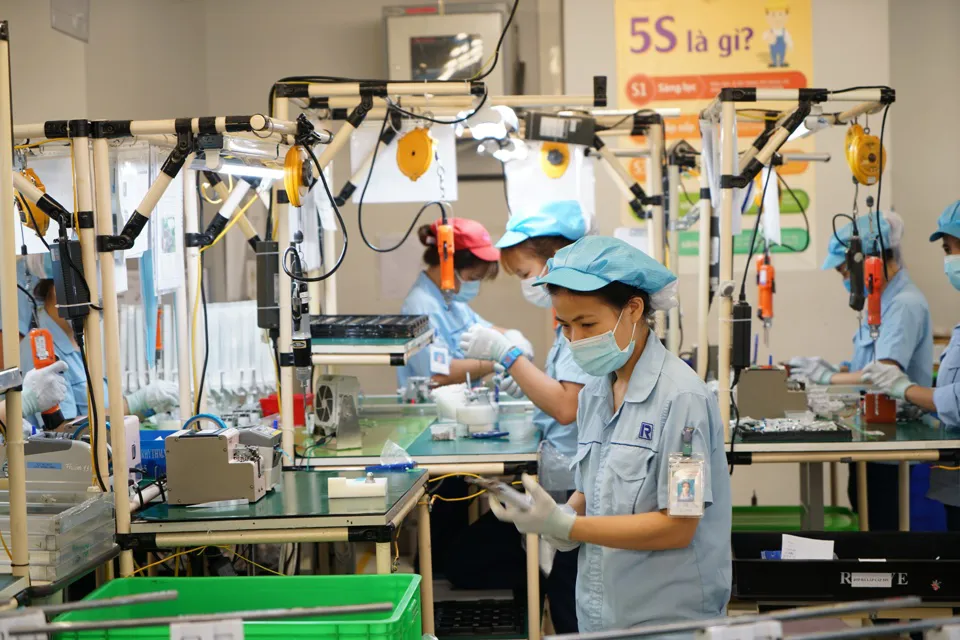Jan-Feb: Hanoi leads in foreign investment registration
As of February 20, Vietnam has attracted more than 39,500 FDI projects with a total registered capital of nearly US$473.1 billion.
Hanoi led provinces and cities nationwide in attracting foreign direct investment (FDI) in the first two months of 2024, according to the Foreign Investment Agency (Ministry of Planning and Investment).
| Electronics production in the Noi Bai Industrial Cluster. Photo: Pham Hung/ The Hanoi Times |
The registered investment capital in the city exceeded US$914 million, accounting for 21.3% of the country's total. Moreover, this amount was 24.4 times higher than that of the corresponding period of last year.
A significant contribution to Hanoi's FDI performance was a new investment project worth over $662 million for urban development. The city also took the lead in January with a total registered investment capital of over $867 million, accounting for 36.7% of the total registered investment capital and 39.7 times higher than the same period in 2023.
The northern province of Quang Ninh ranked second with registered investment capital of over US$471.1 million, accounting for nearly 11% of the nation's total. This was followed by the provinces of Thai Nguyen, Ba Ria-Vung Tau and Bac Ninh.
According to the Foreign Investment Agency, foreign investment capital has been channeled to provinces and cities with advantages in attracting FDI, including good infrastructure, stable labor force, efforts to reform administrative procedures, and proactive investment promotion.
Hanoi, Quang Ninh, Thai Nguyen, Ba Ria-Vung Tau, Bac Ninh, Dong Nai, Bac Giang, Ho Chi Minh City, Haiphong and Hung Yen accounted for 74.3% of new projects and 81.7% of total investment capital in the country in the first two months of 2024, according to the Foreign Investment Agency.
In January-February, the total foreign investment capital (including new registrations, adjustments, contributions, share purchases and capital contributions) exceeded $4.29 billion, up 38.6% year-on-year, according to the Foreign Investment Agency.
The realized investment capital of foreign-invested projects reached about US$2.8 billion, up 9.8% year on year.
During the period, foreign investors invested in 16 out of 21 economic sectors in Vietnam. The processing and manufacturing industry took the lead, with registered investment capital of about $2.54 billion, accounting for 59.1% of the total, up 16.8% over the same period.
Real estate ranked second with nearly $1.41 billion, accounting for 32.7% of total registered investment capital, more than 3.5 times higher than the same period.
It was followed by wholesale and retail trade, professional activities, and scientific and technological activities, with registered capital of $125.2 million and almost $76.4 million, respectively.
In the first two months of 2024, there were 48 countries and territories investing in Vietnam, with Singapore leading with an investment capital of over $2.08 billion, accounting for 48.5% of the total investment capital, more than 2.1 times higher than the same period in 2023. Hong Kong (China) ranked second with nearly $525.7 million, accounting for 12.2% of the total investment capital, nearly 5.1 times higher than in the same period.
As of February 20, Vietnam had attracted more than 39,500 FDI projects with total registered capital of nearly $473.1 billion. The cumulative realized capital of foreign-invested projects reached nearly $300 billion, equivalent to 63.4% of the total registered investment capital.
This is a positive result, especially considering that global FDI activities have been sluggish in recent years, according to the Foreign Investment Agency.













